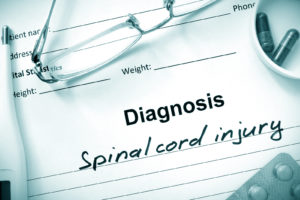There’s no denying Houston’s growing popularity: the city’s population is expected to surge more than 1.2 million over the next decade. This influx of residents—and drivers—will result in an uptick in accidents as well as injuries… but few injuries are more tragic and life-altering than a spinal cord injury. There are many ways that spinal cord injuries occur, and their severity and resulting symptoms vary widely as well. No matter the circumstances, one truth remains: If your injuries were caused by the negligent act of another party, that party is responsible for your injuries and expenses.
Contact the team of Houston Spinal Cord Injury Lawyers and legal professionals at Stewart J. Guss, Injury Accident Lawyers, if you or a loved one in or around Houston suffered a spinal cord injury due to another person’s negligent act. To learn more about spinal cord injuries causes, treatments, and your legal options for coping with one, read on below.
We are a national law firm based in Houston with multiple offices around the country. We also work with affiliate law firms in most states that share our focus and dedication to excellence. No matter where you’re located, we may be able to help you, so call or contact us now. We are open, for free, 24 hours a day, seven days a week, at 800-898-4877, or you may contact us now submit your case for review.
Causes and Treatment of Houston Spinal Cord Injuries
Nearly 300,000 people are estimated to be living with spinal cord injuries in the United States, with over 17,000 new cases each year. Vehicle crashes are the leading cause of spinal injuries in the United States, contributing to 38.6% of such injuries.
Other common causes of spinal cord injury include falls, sports, other recreational activities, and acts of violence, including gunshot wounds. Additionally, the average remaining life expectancy of spinal cord injury victims is significantly below the life expectancies of individuals without a spinal cord injury, and mortality rates are significantly higher in the first year after the injury.
There are different types of spinal cord injuries, and what type an individual suffers will dictate their treatment and recovery expectations.
Types of Spinal Cord Injuries
To start, there are both complete and incomplete spinal cord injuries.
- Complete: A complete spinal cord injury results in total loss of all motor and sensory functions below the site of the injury. A complete spinal cord injury, most commonly caused by a bruise to the spinal cord or compromised blood flow, usually results from an equal impact on both sides of the body.
- Incomplete: An incomplete spinal cord injury occurs when the victim retains some function below the area where the injury occurred. The victim might move one arm or leg or may experience more functioning on one side of the body than the other.
Spinal cord injuries are graded according to the American Spinal Injury Association (ASIA) scale:
- ASIA A: Complete spinal cord injury with no preservation of sensory or motor function.
- ASIA B: Incomplete sensory injury, but complete motor function loss.
- ASIA C: Incomplete motor injury, but less than half the muscle groups can lift-up against the force of gravity with a full range of motion.
- ASIA D: Incomplete motor injury when more than half of the muscle groups can lift against the force of gravity with a full range of motion.
- ASIA E: Normal; no impediment.
The severity of the injury will affect the recovery time and whether full recovery is possible.
Treatment of Spinal Cord Injuries
Seek immediate medical attention after any accident!
The following symptoms may indicate a spinal cord injury:
- Extreme pain or pressure in the neck, head, or back
- Tingling or loss of sensation in the hands, fingers, feet, or toes
- Partial or complete loss over a body part
- Pain or pressure in the thorax
- Changes in urinary and bowel functions, such as urgency, incontinence, and retention
- Trouble breathing
- Unusual lumps on the head or spine
Spinal cord injuries require immediate treatment. First, it is important to stabilize injured individuals, keeping them immobilized to prevent further damage or complications. A foam neck collar is usually used during this step.
Once the injured individual arrives in the emergency room, doctors will ensure they can breathe, take actions to prevent shock, and further immobilize the neck. The medical team will assess an individual’s neurological function and, if weakness is noted, will perform an imaging assessment, such as a CT, a CAT Scan, or an MRI.
While there is currently no way to reverse spinal cord damage, the care team may try to limit damage via:
- Medication: Certain IV medicines may treat acute spinal cord injuries, but many of these medicines are no longer recommended due to negative side effects.
- Immobilization: Traction will help stabilize and align the spine.
- Surgery: Surgery will help remove bone fragments, foreign objects, herniated discs, or fractured vertebrae that are compressing the spine.
- Experimental treatments: As medical technology advances, doctors are trying experimental treatments to prevent cell death and reduce inflammation, such as significantly lowering the body’s temperature for 24 to 48 hours.
For patients diagnosed with a spinal cord injury, the average length of hospital stay is 11 days. Rehabilitation for a spinal cord injury takes an average of 31 days. Ongoing care is often necessary to prevent secondary issues, such as ulcers, blood clots, bowel and bladder issues, and respiratory infections. Rehabilitation will focus on the maintenance and strengthening of existing muscle function, redeveloping motor skills, and learning new skills to allow the patient regain independence in their day-to-day life.
Approximately 30% of spinal cord injury victims are re-hospitalized at least once following the injury. The average length of re-hospitalization is 18 days.
Who Is Responsible for Houston Spinal Cord Injuries?

In general, anyone who acted negligently is responsible for your injuries. Potentially responsible parties include:
- Driver: If the injury occurred in a motor vehicle accident and the other driver acted negligently, that driver is responsible. Any action outside the normal standard of care is evidence of negligence, including violation of traffic laws and regulations. Common infractions include speeding, distracted driving, failure to follow traffic signals or signage, and driving under the influence of drugs or alcohol.
- Driver’s employer: If the driver was on the clock—such as while working as an Uber driver, delivery driver, or trucker—the company that employed or contracted with the driver, or its insurance carrier, might bear liability. All companies that employ or contract with drivers have a responsibility to screen drivers, hire only responsible ones, train them properly, and discipline or fire them if they cannot drive safely. Failure to do any of these tasks can constitute negligence.
Work with an experienced personal injury attorney to analyze the unique facts of your case and investigate all parties potentially responsible for your injuries. Your lawyer will help you understand the strength of the evidence against the negligent actors and develop a strategy to pursue compensation for your injuries.
Recovering Compensation for Your Houston Spinal Cord Injuries
Any party who acted negligently and caused your injuries is responsible for the damages that you have suffered. While medical expenses are usually the most obvious result of your injuries, you must also consider all of the other ways your spinal cord injury has affected you. You can include these in your damages demand.
Common damages suffered after a spinal cord injury include:
- Medical expenses: The negligent party is responsible for all medical costs associated with your spinal cord injury. The estimated lifetime costs of a spinal cord injury will vary based on employment history, education, and neurological impairment, as well as the severity of the injury, but the general range is from $1.2 million to $5.1 million. Common medical expenses include doctor visits, hospital stays, emergency transportation, and assistive devices, like wheelchairs. Spinal cord injuries are highly likely to require ongoing care, like physical therapy, so you should include the future costs of care in your damages demand. Your lawyer will coordinate with medical experts as needed throughout your case.
- Lost income: Spinal injury cord victims will have to miss work during their hospital stay and rehabilitation. If the job requires any physical activity, many spinal cord victims cannot resume regular work. Injured individuals are entitled to recover for lost wages, including working a reduced work schedule or performing light work for lower wages. Be sure to include estimated future impacts on your earning ability in your damages demand, and seek input from an economic expert if needed.
- Property damage: If your injury occurred in a motor vehicle accident, which is the most common cause of spinal cord injuries, your car might have been damaged or destroyed. The defendant is responsible for repairing or replacing any damaged property, including a vehicle or other personal belongings, such as electronics.
- Emotional distress: Spinal cord injury victims commonly suffer from emotional distress as they must deal with the life changes caused by their injuries. Spinal cord injury victims are at a higher risk of developing mental health disorders, including depression and anxiety. Some studies show that spinal cord injuries double the risk of mental health problems, with 48.5% of victims suffering from depression, 37% dealing with anxiety, and 8.4% suffering from post-traumatic stress disorder (PTSD). Emotional distress is difficult to quantify with a dollar amount; work with your lawyer to include any emotional distress in your recovery demand.
- Loss of enjoyment: If any physical activity was an important part of your life before the accident, you may discover that you can’t perform the activity at all or to the same degree after suffering a spinal cord injury. If you cannot participate in activities you once loved due to your injuries, include this loss in your damages demand.
- Punitive damages: Punitive damages are intended to punish defendants, not to compensate plaintiffs for any losses. Most states require that a defendant act in an egregious fashion before awarding punitive damages. In Texas, the defendant must have acted with fraud, malice, or gross negligence to allow for an award of punitive damages. Consult with your attorney on whether punitive damages are available based on the facts of your case.
Your lawyer is a critical partner in preparing a damages demand and protecting your recovery. Work with your lawyer to ensure all damages are included.
One wrong word could jeopardize your recovery. For example, one important consideration is to avoid posting on social media. While you may want to use social media to discuss the accident or your injuries, do not post anything on social media without first discussing it with your lawyer. Your posts may be used against you by the defendant and their insurance providers in order to limit their responsibility. Imagine a scenario where you posted a picture of the car accident with the caption: “I guess I didn’t have my head on straight today.” The defendant will use this as evidence that your lack of focus was the cause of the car accident, rather than the defendant’s negligence.
You should also consult our Houston spinal cord injury lawyers before accepting any settlement offer. While accepting a settlement offer is a tempting way to resolve the matter quickly and get some money in your pocket, early offers are likely to significantly undervalue your suffering and injuries. You should discuss any and all offers with your attorney, who will continually analyze your total damages and the strength of your case.
Stewart J. Guss has been practicing law for 20 years. Over time, he has compiled a team of highly respected and skilled legal practitioners to support injured clients in their personal injury lawsuits. Our team has the knowledge, resources, and experience to vet any settlements you receive in a Houston spinal cord injury case. If you or a loved one has suffered a spinal cord injury because of another party’s negligent actions in or around Houston, contact our firm today for a free case consultation—no waiting required!
Houston Spinal Cord Injury FAQs
A spinal cord injury is a serious interruption to your life. On top of coping with your injuries and adjusting to a “new normal” in your routine, you also have to deal with the financial and emotional impacts of the injury.
If another party’s negligence caused your accident, that party is responsible (and financially liable) for your injuries. Plain and simple.
Read on for answers to questions commonly asked after suffering a spinal cord injury, and learn more about securing recovery for your injuries.
Q: What happens in a spinal cord injury?
The spinal cord is the bundle of nerves that allows the brain to communicate with the body. A spinal cord injury is most commonly caused by a sudden, traumatic blow to the spine that causes a fracture or a dislocated vertebrae. The fracture or dislocation may cause displaced bone fragments or disc material to bruise or tear further into spinal cord tissue.
A common misconception is that most spinal cord injuries sever the spinal cord. While this is possible, fractures and compressed vertebrae that destroy the nerve cells responsible for carrying signals between the brain and body are much more likely to occur. The extent of the injury depends on the number of nerve cells that sustain damage.
Q: What is the difference between an incomplete and complete spinal cord injury?
An incomplete spinal cord injury means that the spinal cord can still convey some messages between the brain and body. Some sensation and movement might also be possible below the level of injury.
On the other hand, a complete spinal cord injury is one that results in a total lack of sensory and motor function below the level of injury.
Q: How do different spinal cord injuries affect the body?
The impact on the body after a spinal cord injury depends on where on the spine the injury occurs.
Most spinal cord injuries affect all areas of the body below the site of the injury.
- Cervical spinal cord injury, C1-C8: This is the topmost portion of the spinal cord where the brain connects to the spinal cord. An injury to the cervical area of the spine can result in paralysis or weakness in both arms and legs, known as quadriplegia. The C1-C8 vertebrae are responsible for signals from the brain to the back of the head, neck, shoulders, arms, hands, and diaphragm. Secondary impacts of a cervical injury may include respiratory issues, an inability to regulate body temperature, and bowel, bladder, and sexual dysfunction.
- Thoracic spinal cord injury, T1-T12: Thoracic injuries are less common, since the rib cage protects this area. These injuries result in paralysis or weakness of the legs (called paraplegia), changes in physical sensations, and bowel, bladder, and sexual dysfunction. The arms and hands are normally unaffected.
- Lumbar spinal cord injury, L1-L5: This is the lower region of the spinal cord where the spine begins to bend. Lumbar injuries result in paraplegia, but shoulder, arm, and hand function are generally preserved. This area of the spine controls signals to the lower abdomen, buttocks, external genital organs, and parts of the leg.
- Sacral spinal cord injury, S1-S5: This is the lowest portion of the spinal cord that is triangle-shaped and bends slightly outward. The main effect of a sacral injury is bowel, bladder, and sexual dysfunction. The victim might also suffer from weakness or paralysis of the hips and legs. The sacral area of the spine controls brain signals to the thighs and lower parts of the legs, feet, and genitals.
Q: How common are spinal cord injuries?
Some fast facts:
- Approximately 12,500 new spinal cord cases arise each year, and between 240,000 and 337,000 individuals living with spinal cord injuries in the United States.
- The average age of a spinal cord injury victim is 42.
- Men account for 80% of all spinal cord injury victims.
- Victims suffering from incomplete quadriplegia are the most common, making up 45% of all cases.
Q: What are the common causes of a spinal cord injury?
- Car accidents are the leading cause of spinal cord injuries, causing 29% of spinal cord injuries in men and 48% of spinal cord injuries in women.
- Additionally, motorcycle accidents account for nearly 7% of spinal cord injuries in men and 2.5% in women.
- Other causes of spinal cord injuries include falls, gunshot wounds, diving injuries, falling objects, and medical and surgical complications.
Q: How does a Houston car accident cause a spinal cord injury?
The sudden force and impact in a car accident put victims at serious risk of suffering a spinal cord injury. The abrupt forward jerking movement of the head in a car accident, commonly called whiplash, can actually cause a cervical spine injury. A side-impact crash forces the spine to rotate and creates a risk of cervical or thoracic spine injury. The impact of the accident could also cause compression in the spine, resulting in fractures that damage the spinal cord.
Q: What are the common signs and symptoms of a spinal cord injury?
Be sure to seek immediate medical attention any time you suffer an injury. If you believe you have suffered a spinal cord injury, it is important to stay still. Emergency responders will work to stabilize your neck and back before transporting you to a hospital.
If you’re unsure whether you’ve spinal cord injury, common indicators include:
- Severe back pain or pressure on the spine, neck, head, or back
- Diminished strength or coordination
- Loss of sensation or function in any part of the body
- Loss of bladder or bowel control
- Numbness or tingling in feet or hands
- Respiratory issues
- Balance issues
- Muscle spasms
If you’re diagnosed with a spinal cord injury, you may need surgery to remove bone fragments. The average hospital stay after suffering a spinal cord injury is 11 days.
Q: Is there a cure for a spinal cord injury?
There is currently no cure for spinal cord injuries; however, there continue to be impressive advancements in the search for a cure.
Q: What is recovery like after a spinal cord injury?
Both physical and psychological recovery is necessary after a spinal cord injury.
Physical recovery will include rehabilitation with a team of medical professionals, including physical and occupational therapists. The rehabilitation will focus on maintaining and strengthening existing muscle function, redeveloping fine motor skills, learning adaptive techniques for day-to-day tasks, and learning to use assistive devices like a wheelchair or prosthesis.
Psychological recovery is also essential. Spinal cord injury victims are at a higher risk of developing mental health disorders, such as depression and anxiety. Some studies show that spinal cord injuries double the risk of mental health problems, with 48.5% of victims suffering from depression, 37% dealing with anxiety, and 8.4% suffering from post-traumatic stress disorder (PTSD). Victims suffering from spinal cord injuries may benefit from entering counseling.
Q: Who is responsible for my spinal cord injury after a Houston car accident?
Any party who acted negligently is responsible for your injuries.
If your spinal cord injury was caused by a car accident, any violation of traffic laws or regulations by the driver is evidence of negligence. Common violations include speeding, driving under the influence of drugs or alcohol, or violating traffic signs or signals.
Other parties commonly responsible for spinal cord injuries include property owners that fail to keep their properties safe, employers that fail to provide safe working conditions, and medical providers who have committed medical malpractice.
Q: What are the average medical costs associated with a spinal cord injury?
The average medical costs will depend on the severity of the injury and the remaining lifespan of the victim. Average lifetime medical costs can range anywhere from $1.2 million to $5.1 million and include costs like doctor visits, hospital stays, emergency transportation, and assistive devices like wheelchairs.
Q: Are medical expenses the only damages that I may recover?
No. You may pursue compensation for all of the damages that you have suffered from the accident. Damages suffered by spinal cord injury victims often include:
- Lost income: One part of life likely affected by a spinal cord injury is an injured individual’s ability to work. Victims will miss work during their hospital stay and rehabilitation. Because spinal cord injuries often affect the mobility of injured individuals, they may never return to their previous jobs or perform their same job responsibilities. Injured individuals are entitled to recover for lost wages, including wages lost from working a reduced work schedule or performing lighter work for lower wages. Work with your lawyer to include an estimate of future lost income and lost earning potential in your damages claim.
- Property damage: If your injury happened in a car accident, your car was probably damaged or totaled. In such circumstances, the negligent party is responsible for repairing or replacing any damaged property, including a vehicle or other personal belongings like electronics.
- Emotional distress: As discussed above, spinal cord injury victims are much more likely to suffer from emotional impacts, like anxiety or depression. Emotional distress is difficult to quantify in a dollar amount; work with your lawyer to include any emotional distress in your damages demand.
- Loss of enjoyment: Spinal cord injury victims often find their lives changed completely due to changes in mobility. If your injuries render you unable to perform an activity that was previously a meaningful part of your life, you should include this loss in your damages demand. A lawyer can help you evaluate the loss and determine an appropriate value.
- Punitive damages: Punitive damages are used to punish defendants rather than to compensate plaintiffs. In Texas, the defendant must have acted with fraud, malice, or gross negligence to allow for an award of punitive damages. Consult with your attorney on whether punitive damages are available based on the facts of your case.
It takes time, but it’s worthwhile to prepare a comprehensive damages assessment. Your lawyer can bring in economic and medical experts to provide necessary support for your case. Be sure to follow all of the advice that your lawyer provides, including any advice regarding speaking publicly about your case and keeping paperwork related to your accident and injuries.
Q: How long do I have to file a Houston spinal cord injury lawsuit?
Every personal injury case has a time limit, also known as a statute of limitations. According to Texas statutes of limitations, a Houston spinal cord injury victim would generally have two years to file a lawsuit for recovery after an accident. Two years may seem like a long time, but it will move quickly as you spend time recovering from your injuries, gathering evidence, and developing a strategy with your lawyer. Don’t delay in finding an experienced lawyer and preparing to file a lawsuit. You don’t want to miss out on the opportunity to recover for your injuries.
Q: Should I accept a settlement offer in my Houston spinal cord injury case?
Not until you talk to our Houston spinal cord injury lawyers.
Defendants and their insurance providers will almost always make one or more settlement offers in the days leading up to trial. The benefits of accepting a settlement offer include eliminating the uncertainty of trial and quickly securing monetary recovery. It is important, however, to carefully consider every settlement offer. Do not settle for less than you deserve, especially after a life-altering event like a spinal cord injury. Most early settlement offers won’t be enough. Our attorneys are here to negotiate, analyze any settlement offer against the strength of your case, and give you the greatest chances of success at trial.
Q: When should I contact your Houston spinal cord injury attorneys?
Contact our lawyers immediately! While the top priority is always securing medical attention, reaching out to an experienced Houston spinal cord injury lawyer is another important step. Your lawyer is a critical partner in determining who is responsible for your accident, compiling evidence, preparing a damages demand, drafting legal pleadings, and assessing settlement offers.
Call an Experienced Houston Spinal Cord Injury Lawyer Today
One of the most important things you can do to help your case after suffering a spinal cord injury is to immediately contact an experienced lawyer. At Stewart J. Guss, Injury Accident Lawyers, our team is focused on securing justice and relief for our clients. We are committed to responding to client emails and phone calls as quickly as possible.

Stewart J. Guss and his team have the knowledge, resources, and experience necessary to handle a wide variety of matters, including Houston spinal cord injuries, and we have the satisfied clients to prove it. If you or a loved one has suffered a spinal cord injury due to someone else’s negligence in or around Houston, contact our firm today for a free case evaluation—no waiting required!
The legal team of Stewart J. Guss, Injury Accident Lawyers, is nationally recognized for protecting the rights of injured victims for more than 20 years. If you suffered a spinal cord injury in Houston, call our office right now for a free consultation! Because we take all of our personal injury cases on a contingency fee basis, you will not owe us a dime unless we win your case. We are available 24 hours a day, seven days a week, so call us today at 800-898-4877 or contact us now by clicking here.
Client Testimonial:
Review: 5/5 ★ ★ ★ ★ ★
“Mr. Guss was wonderful. He fought hard against the insurance company to get us what we deserved. I went from owing almost $5000 in medical bills to actually getting money in my pocket. Absolutely Amazing!!!!! A big thank you from me and my family!!!”
-Karley B.
Stewart J. Guss, Injury Accident Lawyers
12777 Jones Rd #297
Houston, TX 77070
(281) 664-6500





